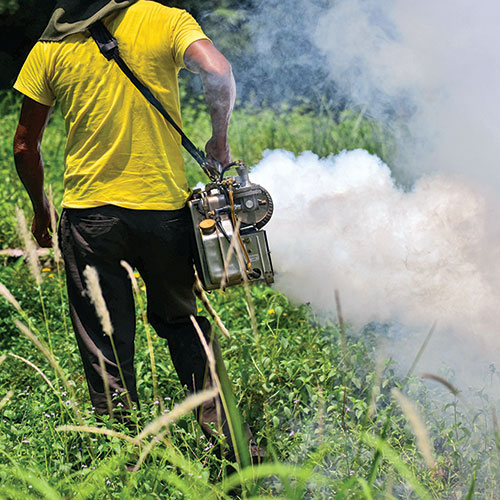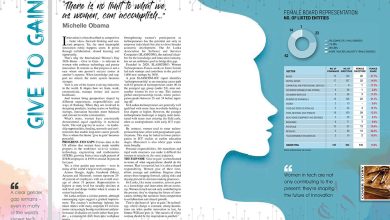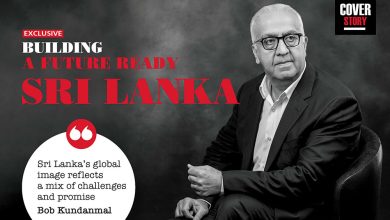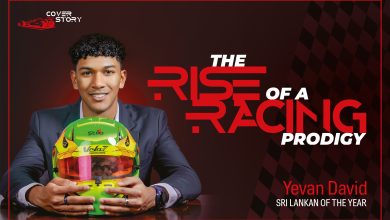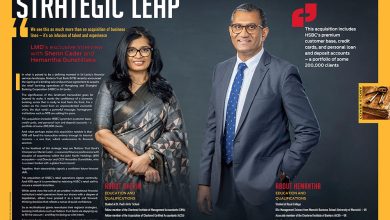LMD JUNE 2025 – COVER STORY

Driven by Discovery
“As a country, we could have achieved far more if not for the inefficiencies and constraints that persist in the system”

She describes herself as a ‘chill person’ – someone who doesn’t take life too seriously, yet is deeply committed to what she loves. For her, it’s all about following her passion for scientific discovery and staying true to herself in the process. Family is her anchor; and living life to the fullest is her philosophy.
Whether it’s making breakthroughs in the lab or helping others along the way, she approaches it all with humility and a sense of purpose. At the core, it’s about curiosity, compassion and the joy of uncovering the unknown.
This refreshingly grounded approach to life is what sets Prof. Neelika Malavige apart from many others – not only as a scientist but as a person as well. She is proof that brilliance and balance can go hand in hand.
Malavige was recently appointed President-Elect of the International Society for Infectious Diseases (ISID), and will assume the presidency in 2027. She will be one of the first Sri Lankans to head the world’s foremost body dedicated to infectious disease research and response.
In addition to being a professor in the Department of Immunology and Molecular Medicine at the University of Sri Jayewardenepura, Malavige is also the Head of the Global Dengue Program at the Drugs for Neglected Diseases initiative (DNDi). Her longstanding commitment to infectious disease research spans two decades with a particular emphasis on dengue and other mosquito borne illnesses.
During the pandemic, Malavige played a lead role in COVID-19 testing, sequencing and identifying virus variants in Sri Lanka. Her work provided crucial insights into the country’s response and this has been internationally recognised.
She is best known internationally for her pioneering research on dengue immunopathogenesis with a focus on immune correlates of protection and biomarkers – work that has directly informed vaccine trials and treatment strategies.
This exclusive interview highlights how, in a world often driven by titles and accolades, Malavige stands as a reminder that true success comes from staying grounded, following your passion and uplifting others along the way.
Compiled by Tamara Rebeira
“What touched me the most was the reaction to the news of my appointment from my peers – colleagues from India, Malaysia, Bangladesh and beyond – who were genuinely thrilled”
BACKGROUND
FAMILY
Husband – Dr. Lasantha Malavige (Chairman of Lassana Group of Companies)
Daughter – 23 years old (Faculty of Medicine, University of Colombo)
Son – 16 years old (preparing for the GCE A-Level Examination)
EDUCATION
Devi Balika Vidyalaya
CREDENTIALS
Faculty of Medicine – University of Colombo
Member of the Royal College of Physicians (MRCP)
PhD in Immunology – University of Oxford
Fellow of the Royal College of Physicians (FRCP) – London
Fellow of the Royal College of Pathologists – UK
Associate Fellow of the Higher Education Academy (HEA) – UK
Fellow of the Sri Lanka Academy of Sciences
HOBBIES
Running and working out
Dancing (she joined a contemporary dance class conducted by Seya and loves it)
Spending time with her children
Q: What does your appointment as the President-elect of the International Society for Infectious Diseases (ISID) mean to you both personally and professionally?
A: I have been working in infectious diseases research for over two decades and it has always been a field that deeply interests me. Naturally, I was drawn to ISID as it’s the largest world body in this space. In fact, I received my very first research grant from the International Society for Infectious Diseases back in 2010 and the organisation has always held a special place in my professional journey.
In 2012, I applied to be a council member almost on a whim, and was surprised and honoured to be selected. That experience led to deeper involvement over the years; and in 2020, I was appointed to the executive committee. Since then, I’ve worked closely with the organisation across multiple areas.
What sets ISID apart for me is its commitment to inclusivity. Unlike many international organisations that are predominantly focussed on high income countries, ISID makes a genuine effort to engage scientists from low and middle income countries too. It recognises that the true burden of infectious diseases lies in these regions.
Most of its conferences are held in accessible locations, enabling researchers from countries such as Sri Lanka or across Africa and Asia to participate, collaborate and exchange scientific ideas. That kind of accessibility and encouragement is rare; and it’s one of the reasons I have remained committed to ISID.
When I was elected president during our last meeting in December, it came as a real surprise. Being on the executive committee – one of only 10 members – was already a noteworthy role. However, this new responsibility was unexpected and incredibly meaningful.
What touched me the most was the reaction to the news of my appointment from my peers – colleagues from India, Malaysia, Bangladesh and beyond – who were genuinely thrilled. It felt like a shared victory – one of us had made it.
Professionally, this appointment brings great international visibility and personally, I’m beyond grateful that people such as myself are being seen and given these opportunities.
Q: And what are your priorities for fostering international collaboration in infectious disease research and response?
A: I have been working on dengue for a very long time. In my early days as a junior doctor, my work was mostly on the clinical side, dealing with patients directly, especially around 2001 to 2004. However, things evolved after I pursued my PhD at Oxford, where I specialised in immunology.
That gave me a deeper understanding of the mechanisms behind diseases such as dengue – what actually causes it, what happens at the immune system level and whether we could identify potential treatments from that angle.
When you’re engaged in serious scientific research, you can’t afford to be a jack of all trades – that simply doesn’t work. If you try to do everything, you will end up doing nothing well. For research that truly makes an impact, you need focus and commitment – and for me, that focus has been dengue.
Of course, when COVID-19 emerged, it changed everything. Anyone working in virology – or on any virus really pivoted to the pandemic, as that was the global emergency. It wasn’t only about academic curiosity anymore – it was about survival. No one knew how far it would spread or how deadly it could be and shifting focus made sense.
It wasn’t only me. Researchers all over the world temporarily put aside their core areas and contributed to the coronavirus response.
Once the crisis began to ease, most of us went back to our original areas of expertise. In my case, that meant returning to dengue. And now it’s becoming an even bigger public health concern.
However, it’s not only dengue. There are other mosquito borne infections we need to take seriously including chikungunya and Zika. My current focus is on mosquito borne diseases – understanding them better and finding ways to mitigate their impact.
SRI LANKA TODAY
STRENGTHS
The people
The country – its beauty, climate and more
Strategic location
WEAKNESSES
Inefficiency in the state system and bureaucracy
Unwillingness to adapt to changing times
Pretending to know things you don’t – similar to the Dunning–Kruger effect
OPPORTUNITIES
Tourism
Human capacity
Being relatively politically neutral in the region
THREATS
Strategic location
Geopolitical interference
Climate change
“My current focus is on mosquito borne diseases – understanding them better and finding ways to mitigate their impact”
Q: How significant is this appointment for Sri Lanka’s scientific and academic community on the global stage?
A: I believe that for Sri Lanka, it’s especially important to inspire young scientists. There’s a major brain drain taking place and many young people are leaving the country. They are convinced that there’s no future here, that meaningful work and impactful research isn’t possible in Sri Lanka.
I understand that sentiment – I received a Commonwealth Scholarship in 2004 and pursued my PhD at Oxford. Upon completion, I chose to return to Sri Lanka even though it was a challenging time. The conflict was raging and by 2009, the situation was particularly dire. Things were bleak economically as well.
Yet, despite the difficulties, I was able to return home and build a research career that had real substance.
People in Sri Lanka may not always know of the kinds of research being carried out locally, especially outside high profile events such as COVID-19. During the pandemic, our work received more attention locally – though it is the dengue research we have done that’s been globally recognised for its impact.
It was difficult but we were able to carry out high quality internationally respected dengue research from within Sri Lanka. That recognition helped open doors – including eventually leading to this role.
For Sri Lanka, this appointment sends a message of hope to the next generation that they don’t have to leave the country to do meaningful work. It’s not easy; but it’s definitely possible. You can stay in Sri Lanka, commit to a cause and still make a difference, not only locally but on the world stage too.
“You can stay in Sri Lanka, commit to a cause and still make a difference, not only locally but on the world stage too”
“In Sri Lanka, with the funding it takes three months to merely process a purchase order through a government institution
Q: Your research on COVID-19 was pivotal to the country’s response to the pandemic. What were the main scientific challenges you faced during that time?
A: The scientific challenges we faced during the pandemic were, in many ways, similar to what we face today. During the lockdown, there were additional obstacles such as transport disruptions, though the core issues remained unchanged.
One might assume that conducting scientific research in Sri Lanka is inherently difficult due to limited resources or infrastructure. One of the biggest barriers, both then and now, is bureaucracy – that has been and continues to be the main challenge.
If you were to ask me what hindered scientific research the most during the pandemic, I’d say it was bureaucracy. If you ask me the same question now, my answer is still bureaucracy.
These are not unsolvable issues. They’re challenges that can be addressed with the right understanding and policy adjustments. Unfortunately, many of our policymakers don’t fully grasp how scientific research is conducted in other parts of the world or what’s required to make our systems internationally competitive.
And in today’s world, if we’re not globally competitive, we risk being left behind entirely. Despite the obstacles, we worked hard. People often say ‘you’ve still done quite well, haven’t you?’ But that’s not the full picture.
Yes, we’ve made progress – though I know I could have done so much more. As a country, we could have achieved far more, if not for the inefficiencies and constraints that persist in the system.
While it may appear outwardly that we have succeeded, the reality is we’ve been operating with unnecessary limitations. It’s frustrating because the potential and capacity exists. And unless structural issues such as excessive bureaucracy are addressed, Sri Lanka will continue to be held back. And that’s the real challenge.
 Q: In your assessment, are countries such as Sri Lanka prepared to meet any future health crises – including pandemics? And what practical steps should we take in this regard?
Q: In your assessment, are countries such as Sri Lanka prepared to meet any future health crises – including pandemics? And what practical steps should we take in this regard?
A: The reality is that many countries simply weren’t prepared for a pandemic such as COVID-19. Even high income nations such as the US mishandled it in ways that were surprising.
In some aspects, the United States fared worse than countries such as Sri Lanka. So no, we weren’t prepared but neither was most of the world. And that’s not entirely unexpected because pandemics by nature tend to catch systems off guard.
That said, I believe valuable lessons have been learned.
There’s now a notable emphasis globally on pandemic preparedness. I’m involved with some of this work through the WHO and other international platforms. As part of this global push, Sri Lanka recently received substantial pandemic preparedness funding from both the World Health Organization and FAO.
These are sizable grants, and they’re intended to support better systems and infrastructure for future health crises. The funds are channelled through the Ministry of Health and as I am based in a university, I’m not directly involved in this process. However, I sincerely hope that the authorities use these resources meaningfully as we do have an opportunity to be better prepared next time.
“This is truly the era of the East”
 FAST FORWARD 10 YEARS
FAST FORWARD 10 YEARS
SRI LANKA
Unless we face an unexpected disruption, which can’t be ruled out entirely, I don’t anticipate anything drastic occurring in the near future. I believe we have learned important lessons from recent crises and that collective experience will serve Sri Lanka well moving forward.
ASIAN REGION
It is clearly on the rise. Through my work, I travel frequently across Asia and the development is palpable – you can feel the momentum everywhere. The transformation is striking, and the progress is visible in infrastructure, innovation and ambition. This is truly the era of the East.
THE WORLD
We are living through a period of rapid global change. And whenever major transitions occur, a certain degree of instability is inevitable. It’s a volatile phase – but one that may ultimately reshape global dynamics in profound ways.
“One of the biggest barriers, both then and now, is bureaucracy – that has been and continues to be the main challenge”
Q: You’ve made remarkable contributions to both coronavirus and dengue research. How do you manage and balance research across multiple high impact diseases?
A: The short and honest answer is that I don’t juggle both; and frankly, no one really can. No one is superhuman. That’s exactly why we had already established a strong foundation in dengue research long before COVID-19 emerged.
When the pandemic hit, we paused all our dengue related work and shifted our entire focus to the coronavirus. And once the pandemic eased, we returned to dengue.
It wasn’t simultaneous because if you truly want to engage in deep and meaningful research, you can’t spread yourself too thin. You cannot do everything at once and expect to do it well. If you are trying to be a jack of all trades in science, you end up mastering none. But if you want to ask and answer important scientific questions, you need to immerse yourself – you need focus.
During the coronavirus, we fully pivoted and contributed heavily. We ended up publishing around 30 papers in high impact international journals and I was invited to speak on vaccine related issues at global forums.
However, I’ve never been known internationally as a COVID-19 researcher. That recognition, at least globally, has always been in the context of dengue.
Globally, dengue is a major issue – especially post-COVID. While Sri Lanka had two relatively mild years after the pandemic, many other countries are now experiencing severe outbreaks.
Dengue and other mosquito borne illnesses remain a major public health priority worldwide – and that’s where my focus continues to be.
“What excites me is the work itself – the questions, the breakthroughs and the chance to do something that matters”
INSPIRING MINDS
Q: You have mentored numerous young scientists over the years. What advice would you offer to aspiring researchers in the field of immunology and infectious diseases?
A: Any field demands true passion. If you are not genuinely invested, it will always feel like a struggle. The same applies to any profession – you need to identify what you care about or you’ll spend twice the energy staying motivated.
When you love what you do, even the hardest days feel worthwhile. Yes, there will be frustration but the passion will keep you going. If you have found your purpose in infectious diseases or immunology, stay with it.
Don’t be distracted by titles, rankings or awards; what truly matters is the work and the impact it makes.
CROSS BORDER RESEARCH
Q: Are Sri Lankan researchers and institutions integrating with global research networks to contribute to and benefit from international scientific advancements?
A: We are actively connected to several global networks focussed on infectious diseases. For instance, we’re part of the Centers for Research in Emerging Infectious Diseases Network (CREID), which includes multiple American universities and institutions in Latin America.
We’re also engaged with the Asia Pathogen Genomics Initiative (Asia PGI), led by Duke-NUS Medical School in Singapore, which focusses on pandemic preparedness and pathogen surveillance.
In addition, we collaborate closely with the University of Hong Kong and the Pasteur Institute and work alongside Prof. Malik Peiris on several initiatives. Our lab is a designated centre for respiratory surveillance and pandemic preparedness studies within the WHO South-East Asia Region (SEARO). We share data and insights across these networks to strengthen global disease surveillance and response.
“Don’t be distracted by titles, rankings or awards; what truly matters is the work and the impact it makes”
Q: Looking ahead, what emerging technologies or areas of research are you most excited about in the fight against infectious diseases?
A: Technology is advancing at a remarkable pace especially in areas such as mobile health tools and AI, and the field of infectious diseases is evolving alongside it.
If you don’t stay actively engaged with these developments, you risk falling behind very quickly. It takes effort and focus to keep up, which is another reason why you can’t afford to spread yourself too thin. If you try to cover too many areas, you end up merely scratching the surface.
There is tremendous potential in using technology to understand infectious diseases better, from diagnostics and surveillance to treatment strategies – and that’s something I’m deeply interested in.
In the context of Sri Lanka, one area I’m particularly excited about is the intersection of metabolic and infectious diseases. My main research interest lies in understanding how conditions such as diabetes, obesity and other metabolic disorders influence the body’s response to infections.
Typically, when we talk about diabetes or obesity, people immediately think of noncommunicable outcomes such as heart attacks or strokes – understandably so, as these are leading causes of death both in Sri Lanka and across the world. But what we now know is that metabolic diseases also make people far more vulnerable to infections.
For instance, during COVID-19 it became clear that those with diabetes or obesity were among the most likely to experience severe illness or death. The same trend appears in dengue as well.
Globally, the prevalence of these metabolic conditions is rising rapidly. For me, it’s not only about studying infectious diseases in isolation. The body is a complex, interconnected system and we need to start thinking about it in those terms. This integrated perspective is particularly relevant to Sri Lanka; and it’s where I believe we can make a significant impact in the future.
“There is tremendous potential in using technology to understand infectious diseases better, from diagnostics and surveillance to treatment strategies”
CRISIS COMMUNICATIONS
Q: How important is effective science communication in combatting misinformation, especially during health crises such as the pandemic?
A: In times of infectious disease outbreaks or pandemics, misinformation spreads rapidly – and a powerful way to counter this is through honesty. It may sound simple, but it’s critical. When unaware of something, one must learn to admit as much.
The danger comes when people attempt to cover gaps in knowledge by bluffing or making assumptions. Audiences aren’t naïve – many are aware when someone makes things up.
I’ve often been asked questions outside my area of expertise – and always say I don’t know. That response builds trust far more than pretending to have all the answers. Transparency isn’t simply a virtue – it’s essential to fighting misinformation.
“Transparency isn’t simply a virtue – it’s essential to fighting misinformation”
Q: What do you believe are the main barriers to becoming internationally competitive – especially in terms of conducting research? And in your view, how can the administration better support efforts in this area?
A: There is no doubt that health funding in Sri Lanka is limited. Only a small portion of the national budget is allocated to health and within that, an even smaller fraction is earmarked for research.
Yet, the problem isn’t simply about how much is allocated; it’s about how the system operates.
For example, when I completed my PhD at Oxford, if I had a research idea and needed to order something, it would be on my desk within two or three days. I could move forward with experiments, analyse results, revise the hypothesis and make real progress – all in a matter of weeks.
In Sri Lanka, with the funding it takes three months to merely process a purchase order through a government institution. Then another three months to receive the item and that’s if you are lucky.
We are talking about four to six months for something that takes two days elsewhere. And if the customs is involved, a donated item can get held up for a month or two, requiring multiple layers of letters and approvals from various authorities.
Bureaucratic bottlenecks are the single biggest barrier to research in Sri Lanka – it’s not a lack of talent. It’s not always a lack of funding. It’s the inefficiency and red tape that make it nearly impossible to be internationally competitive.
And the concerns don’t end with procurement. When we received a US$ 1.5 million research grant from the National Institutes of Health (NIH) in 2020, things got even more complicated. Before 2019, approval from the Vice Chancellor of the University Grants Commission (UGC) would suffice to access the funds. Today, the process involves the ministries of higher education, finance, foreign, national planning, the cabinet and international clearance.
And by the time we secure all approvals, which often takes over a year, the grant cycle is already at risk. Funders expect progress reports within that first year. You can’t make claims like ‘we’re still awaiting government clearance.’
It’s deeply frustrating as these are not tough issues to address. Why are there so many additional layers? What are we really protecting ourselves against: corruption or progress?
Every time I’m given an opportunity to speak at scientific forums, I bring this up. Yes, people may look at my work and say well, you seem to be doing okay. But they don’t see the unnecessary hurdles behind the scenes or what could have been achieved if the system supported scientists.
It is similar to running a race with weights tied to your legs. These barriers are entirely fixable with sensible science friendly policies. We don’t need miracles – we only need someone to listen and act. Scientists in Sri Lanka can compete globally – but only if the system allows them to do so.
Q: On a separate note, being listed among the world’s top two percent of scientists is no small feat. What legacy would you like to leave behind – both in terms of scientific contribution and leadership in global health?
A: At the end of the day, if you are chasing rankings or titles, you’re bound to lose your way. In academia, we have citation indices, H-indices and global rankings such as the top two percent scientists lists. My name appeared on one of those lists once but it meant very little to me. I looked at it, said ‘okay’ and moved on as that’s not what drives me.
What truly matters is doing meaningful work – research that has real world impact, and helps others and advances knowledge in a way that’s useful. That’s what gives this work purpose.
I’m surrounded by brilliant scientists at Oxford – people who are doing exceptional work. And none of them are obsessing over rankings. It’s about the love of discovery. The joy of inquiry. That’s what sustains a scientific career over the long term – not external validation.
If you start chasing titles, awards and labels, you risk being distracted from what actually matters. Being in the top two percent may sound impressive on paper but honestly, who cares? It’s not exciting. It is not why I get out of bed every morning.
What excites me is the work itself – the questions, the breakthroughs and the chance to do something that matters.
That’s what keeps the passion alive and guides any scientist who wants to make a real difference.
“Dengue and other mosquito borne illnesses remain a major public health priority worldwide – and that’s where my focus continues to be”



